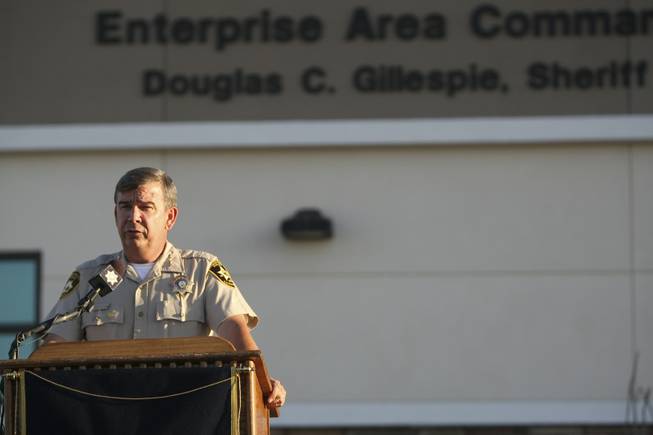
Mona Shield Payne / Special to the Home News
Sheriff Douglas Gillespie thanks those who were instrumental in the completion of the Enterprise Area Command Substation during the grand-opening celebration Tuesday. The Las Vegas Metropolitan Police Department’s newest substation is located at 6975 West Windmill Lane off of South Rainbow.
Friday, March 14, 2014 | 2 a.m.
Las Vegas residents living in the western valley might get another Metro Police substation if a department reorganization moves forward.
The win for that end of town, however, likely comes with a loss for people living in southern Las Vegas. Metro leaders are considering closing the South Central area command, located at Las Vegas Boulevard and Russell Road.
The possibility lies in a broad reshuffling of employees aimed at making the financially strained department more efficient with fewer officers, said Assistant Sheriff Kevin McMahill, whose office is researching the changes.
The new area command would occupy a Metro building, which now houses the Traffic Bureau, on Eldora Street, between Durango Drive and Cimarron Road. When constructed several years ago, the building was pegged as a substation, but the deteriorating economy at the time prevented the department from opening it as such, McMahill said.
But the need for an additional substation on that side of the valley didn’t subside.
The Northwest and Enterprise area commands, which cover a combined 206 square miles, handle about 33 percent of Metro’s calls for service. A third substation would help shoulder the burden of calls and cut down on drive time between locations, McMahill said.
The department-wide reorganization also proposes creating “generalist detective” positions at the area commands — a move that would reduce the amount of highly specialized detectives working from Metro’s headquarters on Martin Luther King Boulevard.
The concept isn’t entirely new: About six years ago, the department moved detectives investigating property crimes to the area commands.
Generalist detectives would focus more broadly on crime committed in certain geographic areas. No longer tied to investigating a specific type of crime, these detectives could potentially connect the dots quicker about one person or group’s criminal activity in an area.
In today’s criminal landscape, suspects often engage in an array of illegal activities, such as gangs, drugs and robberies, McMahill said.
A number of higher-ranking staff members, such as sergeants and lieutenants, would move with the detectives to maintain proper supervisory ratios across the board, he said.
“We’ve been doing a very good job against crime, but we’re starting to see an uptick again,” he said. “It requires us to push a reset button and figure out a way to remain very good at what we do.”
Metro ended last year with a 2 percent overall reduction in crime, but homicides and robberies increased by 21 and 2 percent, respectively.
A contingent of highly specialized detectives would remain “centralized” at Metro headquarters to investigate homicides, sexual assaults, financial crimes and certain robberies, McMahill said.
The personnel shuffling could free up Metro from needing to lease an offsite building — a potential cost savings in the “millions of dollars,” McMahill said.
Metro spends nearly $17 million annually on facility leases, including $13 million for the department’s headquarters. When Metro moved into its new digs in 2011, leaders touted the three-building campus as a model of efficiency, which put dozens of agency bureaus in a single location for the first time.
Chris Collins, executive director of the Las Vegas Police Protective Association, said the plan to remove a chunk of detectives from headquarters raises an obvious question: “If we’re going to decentralize, did we really need the buildings?”
Collins also questions whether the area commands can accommodate the extra bodies and desks.
“They are filled to the seams right now,” he said.
McMahill downplayed the notion of a mass exodus from headquarters and, because of the current officer shortage, doesn’t see space being an issue at the substations.
The department lost 426 police officer positions the past few years, according to Metro’s proposed budget for the 2014-15 fiscal year. The tentative budget calls for adding 122 more officers to the force.
“The overall footprint at headquarters I don’t think would change because we’re continuing to move some of those (employees at) offsite locations back into headquarters as those detectives would leave,” McMahill said.
McMahill said he expects the department to begin the reorganization within a few months, although exact plans have not been decided. A group tasked with evaluating the changes has been busy interviewing those who would be affected to get feedback and suggestions.
Any changes would be done to better fight crime with existing resources, he said.
“It’s a really, really complex change,” he said. “It’s an uncomfortable change. … There’s always going to be pushback associated with that change, but I feel comfortable we’re going to make decisions for the right reasons.”

Join the Discussion:
Check this out for a full explanation of our conversion to the LiveFyre commenting system and instructions on how to sign up for an account.
Full comments policy